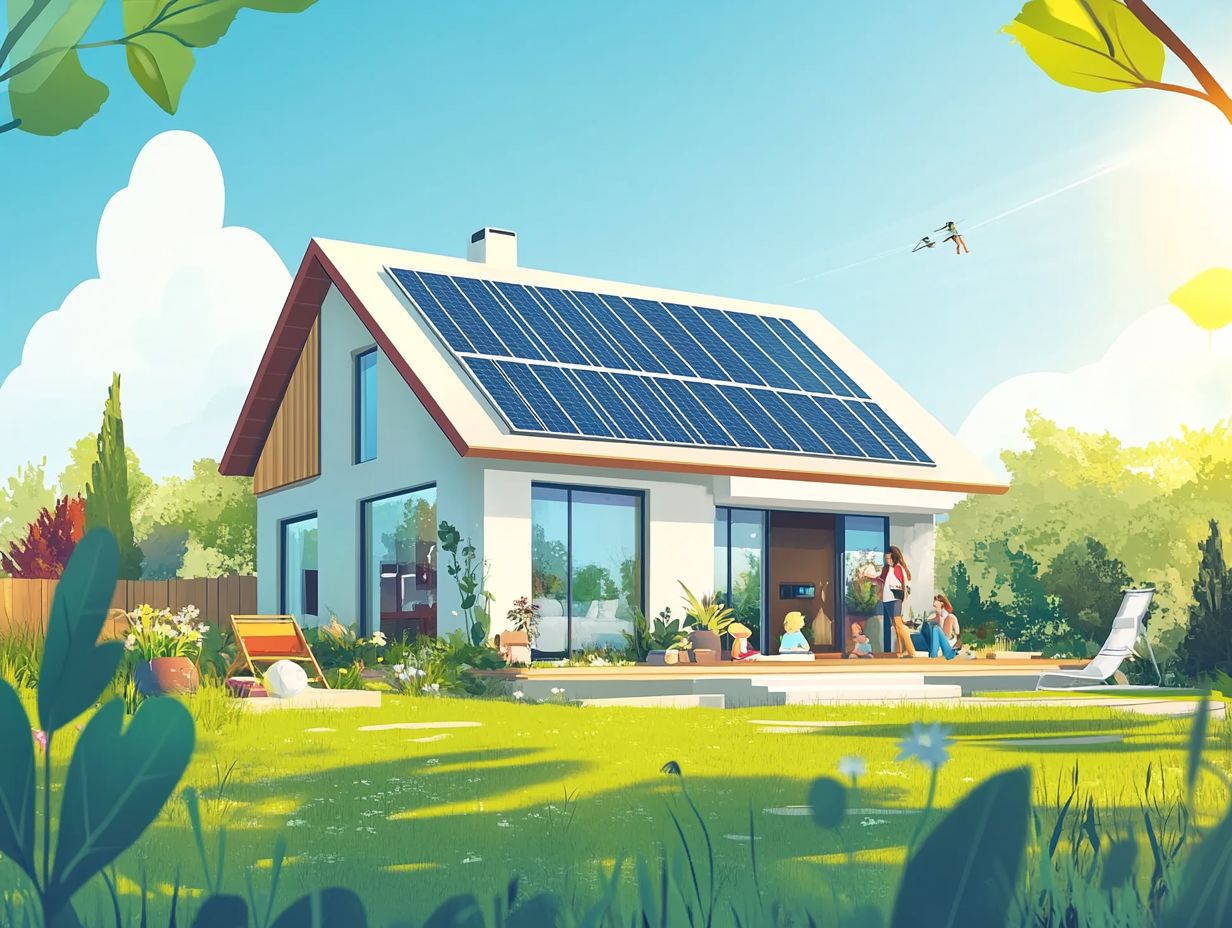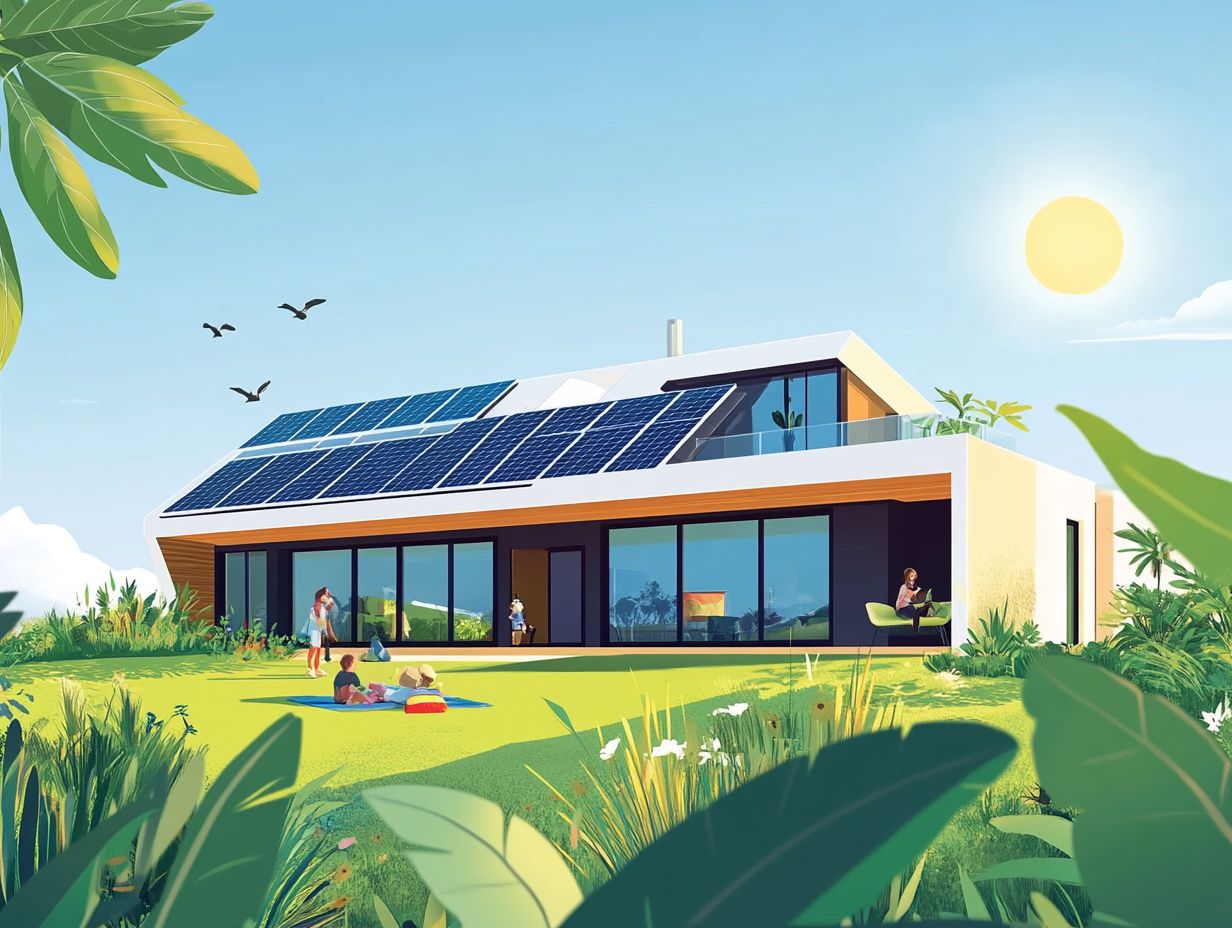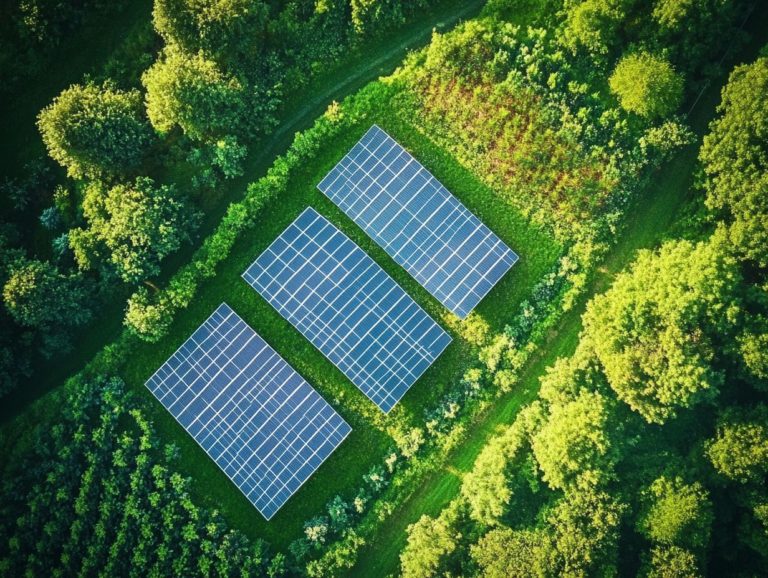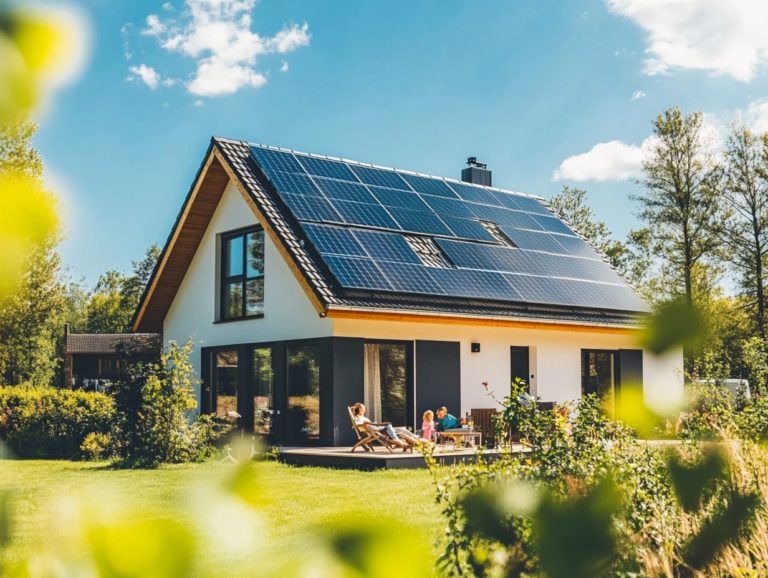“The Role of Solar Energy in Sustainable Living”
As the world increasingly seeks sustainable solutions to combat climate change, solar energy stands out as a compelling choice for you.
This article delves into the essentials of solar power, outlining its various applications and the benefits it offers, both environmentally and financially.
You’ll discover key factors to consider before making the switch, along with practical tips for maximizing energy efficiency.
Exciting innovations are shaping the future of solar technology. Immerse yourself in this exploration and see how solar energy can transform your life and contribute positively to the planet.
Contents
- Key Takeaways:
- The Basics of Solar Energy
- The Benefits of Solar Energy
- Solar Energy Systems for Sustainable Living
- Factors to Consider Before Switching to Solar
- Maximizing the Use of Solar Energy
- The Future of Solar Energy
- Frequently Asked Questions
- What is the role of solar energy in sustainable living?
- How does solar energy contribute to sustainable living?
- What are some examples of how solar energy can be incorporated into sustainable living practices?
- Is solar energy a reliable source of renewable energy for sustainable living?
- What are the environmental benefits of using solar energy in sustainable living?
- How can individuals and communities support the role of solar energy in sustainable living?
Key Takeaways:

Solar energy is a renewable source of energy that can be harnessed for various uses, making it a key player in sustainable living.
Switching to solar energy brings both environmental and financial benefits, helping to reduce your carbon footprint and save on utility bills.
Before making the switch to solar, consider factors such as cost, location, and maintenance to ensure optimal efficiency and long-term sustainability.
The Basics of Solar Energy
Solar energy, sourced from the sun’s radiant energy, is crucial in the global movement toward sustainable energy solutions.
By harnessing solar power through well-installed solar panels, you can generate clean energy right from your own home, greatly cutting down your energy use and reducing the carbon footprint from fossil fuels.
This renewable resource is crucial for preserving our environment now and for the future! It also enables you to achieve greater energy independence and the promise of financial savings.
As technology evolves, advancements in photovoltaic cells devices that convert sunlight into electricity enhance efficiency and accessibility, making solar energy a practical option for countless households and businesses alike.
Embracing this innovative energy source positions you at the forefront of a brighter, more sustainable future.
Understanding Solar Power and its Uses
Understanding solar power means appreciating its remarkable ability to convert sunlight into usable energy, primarily through the sophisticated workings of photovoltaic cells.
This conversion process kicks off when solar panels eagerly absorb photons from sunlight, exciting electrons and generating an electric current for your use.
You’ll encounter various types of photovoltaic technologies within these panels. For instance, PERC cells stand out due to their enhanced efficiency, reflecting sunlight back into the layer for superior absorption.
Thin-film technology offers a lighter, more flexible alternative, making it suitable for a wide range of applications.
As solar power continues to gain momentum, it’s becoming increasingly integrated into residential and commercial spaces. This shift enables homeowners to lower their energy bills while enabling businesses to harness renewable energy sources, contributing to a more sustainable future.
The Benefits of Solar Energy
Solar energy offers countless amazing benefits, giving you substantial financial savings while also dramatically decreasing the carbon footprint linked to conventional energy sources.
By embracing solar power, you contribute to a more sustainable and environmentally friendly planet.
Environmental and Financial Advantages
The environmental benefits of solar energy are impressive. It reduces your carbon footprint while promoting clean energy solutions that actively combat climate change.
This renewable energy source not only lessens your reliance on fossil fuels but also cuts down on greenhouse gas emissions, helping to create a cleaner atmosphere for generations to come.
Beyond its ecological advantages, both individuals and businesses stand to gain financially by embracing solar technology.
Imagine slashing those utility bills; as you harness energy from sunlight, your dependence on traditional power sources diminishes.
Plus, numerous government and local programs provide financial incentives, such as tax credits and rebates, making solar panel installation an environmentally responsible and economically savvy choice.
Solar Energy Systems for Sustainable Living

Solar energy systems are designed to maximize the benefits of solar technology. They combine components like solar panels, sophisticated devices that convert solar energy into electricity, and battery storage.
This combination provides efficient renewable energy solutions, paving the way for a more sustainable lifestyle.
Types of Systems and Their Components
Solar energy systems come in various forms, including grid-tied, off-grid, and hybrid systems. Each type includes essential parts such as solar panels, sophisticated devices for conversion, and battery storage.
Take grid-tied systems, for instance. These systems connect to the local utility grid, allowing you to draw power as needed while sending excess energy back to the grid. This ultimately reduces your electricity bills.
On the other hand, off-grid systems function independently, relying on battery storage to provide energy in remote areas without grid access. Hybrid systems offer the best of both worlds, merging grid connectivity with off-grid capabilities for added flexibility and reliability.
Your solar panels’ efficiency is crucial. It determines the overall energy output by converting sunlight into usable electricity. The sophisticated devices used in these systems optimize this conversion process, ensuring you maximize every bit of harvested energy.
Factors to Consider Before Switching to Solar
Transitioning to solar energy requires careful consideration of various factors. Assessing installation costs, evaluating the location of solar homes, and factoring in ongoing maintenance are essential for optimal energy consumption.
Each of these elements is vital for ensuring your investment is both efficient and effective.
Cost, Location, and Maintenance
The cost of installing solar energy systems varies significantly based on your location, property size, and available incentives. It’s essential to evaluate these factors before proceeding.
Your geographical area greatly influences solar exposure, directly impacting energy generation potential. By installing solar panels in sunnier regions, you may see a quicker return on investment compared to those in less favorable climates.
The size of your property and the orientation of your roof also impact system efficiency, making careful assessment necessary. Maintenance is key to sustaining optimal performance. Regular cleaning of the panels and periodic professional inspections help identify issues early, ensuring your solar system operates at peak capacity and provides long-term savings on energy bills.
Maximizing the Use of Solar Energy
To truly harness your solar energy potential, implement strategies that enhance energy efficiency.
This includes leveraging advanced technologies like net metering and battery storage, allowing you to optimize both energy production and consumption effortlessly.
Tips for Optimal Energy Efficiency

To achieve optimal energy efficiency, prioritize the proper placement of solar panels, ensure regular maintenance, and consider incorporating battery storage solutions to capture excess energy.
This keeps your solar panels clean and functional, primed to generate maximum power year-round. Strategic placement is key; consider your roof angle, nearby obstructions, and sunlight direction these factors greatly impact your energy output.
Routine maintenance, such as washing the panels and inspecting for damage, extends their lifespan. By integrating battery storage systems, you effectively harness surplus energy produced during peak sunlight hours, ensuring a reliable energy source during cloudy days or at night.
This not only enhances your overall sustainability but also reduces your reliance on the grid.
The Future of Solar Energy
The future of solar energy looks exceptionally promising, with ongoing innovations and advancements in solar technology paving the way for increasingly efficient and accessible renewable energy solutions worldwide.
As these developments unfold, you can anticipate a landscape where solar power becomes an integral part of sustainable living.
Don t miss out on the opportunity to embrace solar energy act now to harness the sun s power!
Innovations and Advancements in Solar Technology
Innovations in solar technology are transforming the way we harness solar energy. New developments, such as bifacial panels, which can collect sunlight from both sides, and enhanced photovoltaic cells, significantly boost efficiency and production.
These advancements maximize energy output. Innovations like perovskite solar cells are set to dramatically improve energy conversion rates.
The integration of battery storage systems and smart grid technologies further enhances our ability to store excess energy for later use. This makes solar power more reliable and versatile than ever before.
As these revolutionary solutions emerge, they pave the way for a robust renewable energy landscape. This helps reduce our reliance on fossil fuels and decrease greenhouse gas emissions worldwide.
Watch this video to learn more about the innovations in solar technology!
Frequently Asked Questions
What is the role of solar energy in sustainable living?
Solar energy plays a crucial role in sustainable living. It provides a renewable and clean source of energy that reduces reliance on fossil fuels and mitigates the impact of climate change.
How does solar energy contribute to sustainable living?

Solar energy helps reduce carbon emissions and decreases utility costs. It also promotes energy independence and enhances security.
What are some examples of how solar energy can be incorporated into sustainable living practices?
Solar energy can be integrated into sustainable living practices through the installation of solar panels on homes, businesses, and communities. Additionally, solar-powered appliances and vehicles are great examples.
Is solar energy a reliable source of renewable energy for sustainable living?
Yes, solar energy is a reliable source. It is abundant, accessible, and can be harnessed even on cloudy days.
What are the environmental benefits of using solar energy in sustainable living?
Using solar energy helps to reduce air and water pollution. It conserves natural resources and preserves ecosystems by minimizing reliance on non-renewable energy sources.
How can individuals and communities support the role of solar energy in sustainable living?
Individuals and communities can support solar energy by investing in solar technology and advocating for renewable energy policies. Reducing energy consumption through energy-efficient practices also makes a difference.
Start your journey towards a sustainable future with solar energy today!






